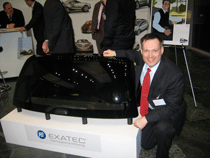Exatec forms Indian team for PC abrasion resistance
Exatec, the Sabic Innovative Plastics' subsidiary responsible for development and marketing of polycarbonate window glazing systems, has formed a team at the supplier's R&D center in India to drive development of abrasion resistance and scratch resistance.
March 25, 2010
Exatec, the Sabic Innovative Plastics' subsidiary responsible for development and marketing of polycarbonate window glazing systems, has formed a team at the supplier's R&D center in India to drive development of abrasion resistance and scratch resistance.
Polycarbonate (PC) window glazing for automobiles has all the appearance of a "next great thing" but its breakthrough awaits. There have been some limited commercial applications, introduced both by Exatec and by the window glazing business unit of Bayer MaterialScience, a competing (to Sabic IP) supplier of PC, and also Sabic's former partner in Exatec. The two PC suppliers parted ways in August 2007 when Sabic bought Bayer's 50% share in the two firms' Exatec joint venture, which they had formed in 1998 to develop and promote the technology.
Stephan Schuler, chief technology officer at Exatec, spoke with MPW last week at the "Plastics in automotive engineering" event in Mannheim, Germany and said he believes the mass shift to PC car windows is a question of when and not if. "We just keep going through the list of technical consumer, legal and OEM expectations" and make sure we have a solution to every one of those, he said. If the PC windows have problems, Schuler will be among the first to know; he drives a test vehicles with all of its windows, minus the windshield, molded from PC using Exatec's technology.
|
Exatec's Stephen Schuler: PC automotive windows have a huge future. |
The company offers both wet coatings and plasma coatings for its PC glazing, and he believes both offer advantages. Wet coats provide UV stability and scratch resistance, he said, while plasma coatings give better abrasion performance. Regardless of the coating used, PC windows have found the fancy of car designers. "Look at any concept car," noted Schuler, "and you'll see more curves, more accent on design—more that PC can offer and glass cannot."
The march to replace glass includes many intermediate steps. For instance, Schuler said Exatec has developed a means for a robot to apply a silver-paste defroster to rear PC windows, and also continues its testing to prove these windows' resistance to windshield-wiper abrasion.
Find background on the technology and the history of PC glass glazing in this article from last summer. —Matt Defosse
About the Author(s)
You May Also Like



